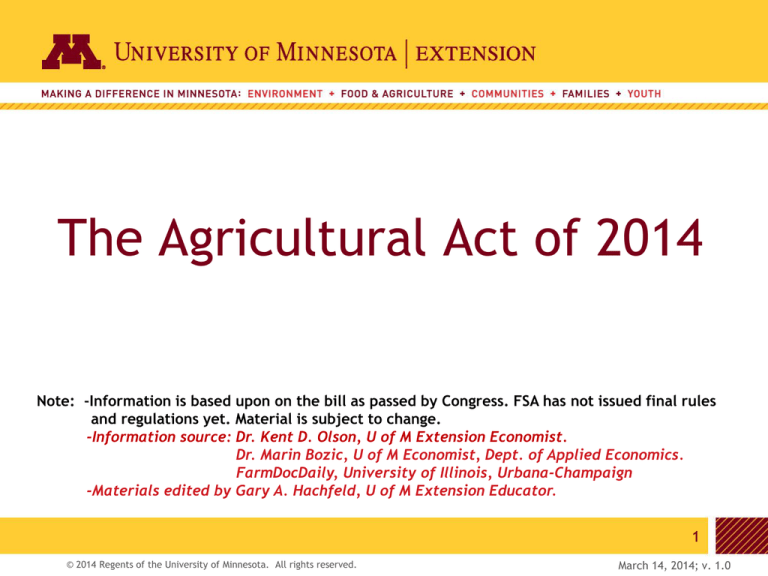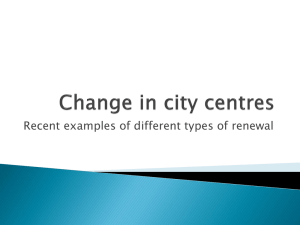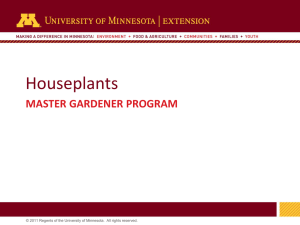
The Agricultural Act of 2014
Note: -Information is based upon on the bill as passed by Congress. FSA has not issued final rules
and regulations yet. Material is subject to change.
-Information source: Dr. Kent D. Olson, U of M Extension Economist.
Dr. Marin Bozic, U of M Economist, Dept. of Applied Economics.
FarmDocDaily, University of Illinois, Urbana-Champaign
-Materials edited by Gary A. Hachfeld, U of M Extension Educator.
1
© 2014 Regents of the University of Minnesota. All rights reserved.
March 14, 2014; v. 1.0
AGRICULTURAL ACT OF 2014
I.
II.
III.
IV.
V.
VI.
Commodities
Conservation
Trade
Nutrition
Credit
Rural Development
VII. Research, Extension,
and Related Matters
VIII.Forestry
IX. Energy
X. Horticulture
XI. Crop Insurance
XII. Miscellaneous
2
© 2014 Regents of the University of Minnesota. All rights reserved.
TODAY’S OUTLINE:
What’s new, what’s gone, what continues
Decisions to be made
Update payment yields?
Reallocate base acres?
Price Loss Coverage (PLC)
Agricultural Risk Coverage (ARC)
Dairy Program
Conservation Programs
Crop Insurance
3
© 2014 Regents of the University of Minnesota. All rights reserved.
OVERVIEW FOR CROPS
Title I. Commodities
4
© 2014 Regents of the University of Minnesota. All rights reserved.
WHAT’S NEW:
Price Loss Coverage (PLC)
Agricultural Risk Coverage (ARC)
Supplemental Coverage Option (SCO)
$125,000 payment limit per person:
For Title I programs: PLC, ARC, marketing loan gains, LDPs.
$900,000 AGI limit to receive any payments:
Based on 3-year rolling average AGI.
No separate measure for an agriculture AGI.
5
© 2014 Regents of the University of Minnesota. All rights reserved.
WHAT’S GONE:
Direct payments:
– Except for a declining amount for cotton.
Counter-Cyclical Payments:
– Replaced by Price Loss Coverage (PLC).
ACRE Payments:
– Replaced by Agricultural Risk Coverage (ARC).
6
© 2014 Regents of the University of Minnesota. All rights reserved.
WHAT CONTINUES:
Marketing Assistance Loans
Marketing Loan Gains
Loan Deficiency Payments (LDPs)
Note: Same rules as in 2008 farm bill
Same loan rates (except cotton)
7
© 2014 Regents of the University of Minnesota. All rights reserved.
Loan Rates ($) (set in 2014 farm bill)
Corn
1.95 /bu.
Grain Sorghum
1.95 /bu.
Soybeans
5.00 /bu.
Dry Peas
5.40 /cwt
Wheat
2.94 /bu.
Lentils
11.28 /cwt
Barley
1.95 /bu.
Small Chickpeas 7.43 /cwt
Oats
1.39 /bu.
Large Chickpeas 11.28 /cwt
IRREVOCABLE DECISIONS
in 2014:
1. Update payment yields
2. Reallocate current base acres
3. Commodity program election:
a. Price Loss Coverage (PLC)
b. Agricultural Risk Coverage
i.
ii.
ARC-county option
ARC-individual option
FSA has not issued final rules and regulations yet.
Sign-up deadlines are likely late summer, fall, winter, into 2015.
9
© 2014 Regents of the University of Minnesota. All rights reserved.
WHO DECIDES?
Land owner(s):
– Update payment yields
– Reallocate base acres
Owner(s) and Producer(s):
– PLC, ARC-county, or ARC-individual?
If a unanimous decision is not made:
– FSA will deem PLC to have been elected.
– NO payments for the 2014 crop year.
10
© 2014 Regents of the University of Minnesota. All rights reserved.
UPDATE PAYMENT YIELDS?
A. Update payments yields
to 90% of average yields per planted acre from
2008 to 2012.
B. Keep current payment yields
at those used in 2008 farm bill.
Decision can be made crop by crop.
Which yield is higher?
Can update yields & not reallocate base acres.
Payment yields are used only for PLC.
11
© 2014 Regents of the University of Minnesota. All rights reserved.
UPDATE PAYMENT YIELDS?
If owner decides to update:
– A year is excluded from calculation if no acres were
planted to a cover crop.
– A “substitute yield” is used when FSA farm yield is
less than 75% of its 2008-2012 average county yield.
Current yields could be yields from as far back
as 1981-1985 or 1998-2001.
Since there is no penalty or harm for updating
payment yields, makes sense to do so IF
calculation works out to be a higher yield.
12
© 2014 Regents of the University of Minnesota. All rights reserved.
Example Calculation
of
Updated Payment Yield for Corn
Yield per Planted Acre
Substitute Yield:
75% of 2008-12 County
Average
Yield
Yield Used in Payment
Calculation
2008
2009
2010
2011
2012
Planted:
No
Evidence
154
175
No
Planted
Acres
100
112
112
112
112
112
112
154
175
112
Sum
Of
Yields
Average
Yield
(divide by 4)
Payment
Yield
(90%)
553
138
124
Question is: Will new yields be higher than current yield being used?
REALLOCATE BASE ACRES?
A. Retain current base acre allocation across
program crops.
B. Reallocate base acres across program crops
based on average proportion of planted &
prevented planted in 2009 to 2012 crop years.
NOTE: Total base acres cannot be increased,
only reallocated.
14
© 2014 Regents of the University of Minnesota. All rights reserved.
Example Calculation
of
Reallocated Base Acre Option
Crops
Base
Acres
Crop
History
2009
Crop
History
2010
Crop
History
2011
Crop
History
2012
Average
Planting
2009-12
Reallocation
Percentage
Reallocated
Base Acre
Option
Alfalfa
0
20
20
20
20
NA
NA
NA
Corn
50
50
40
30
40
40
50%
50
Oats
10
0
0
0
0
0
0%
0
Soybeans
30
30
32
50
32
36
45%
45
Wheat
10
0
8
0
8
4
5%
5
Total
Covered
Crops
100
100
100
100
100
80
100%
100
Question is: Which crops will have highest projected payments?
REALLOCATE BASE ACRES?
Is an important decision because both PLC & ARC
programs make payments on base acres.
Decision rests with the owner of the FSA farm.
Decision applies to all covered crops on the FSA farm
and takes effect with the 2014 crop year.
Crop must have been planted for harvest, grazing,
haying, silage or other similar purposes.
Prevented planted acres count. Must be due to
conditions beyond producer’s control – drought,
flood, other natural disasters.
16
© 2014 Regents of the University of Minnesota. All rights reserved.
REALLOCATE BASE ACRES?
All years are included whether or not a cover crop was
planted.
Base acres can included double cropping if deemed by
Secretary of Ag as an established practice in the
area.
Base acre decision is independent of the payment yield
update decision. Base acres can be reallocated
without updating yields and vice versa.
If no decision is made, owner retains current base acres.
17
© 2014 Regents of the University of Minnesota. All rights reserved.
REALLOCATE BASE ACRES?
If you have base acres no longer planted to that crop
(oats, wheat, etc.) may make sense to reallocate
those acres to corn or soybeans.
Crop rotation, inclusion of zero acres planted to covered
crop when calculating the reallocated acres and the
changing mix of crops (more corn and soybeans)
means base acres can differ notably from current
base acres.
Question remains: Are the crops in the current base
more likely to have higher future payments than
those same crops in 2009-12?
18
© 2014 Regents of the University of Minnesota. All rights reserved.
REALLOCATE BASE ACRES?
Appears decision may rest on two issues:
– To minimize financial risk and bring future base acre
allocations more in line with what is actually being
planted.
– To maximize government payments which is based
upon what the owner feels future yields and prices
will be. Since both PLC & ARC payments are based
upon base acres, reallocating more toward what is
actually planted may help maximize government
payments.
19
© 2014 Regents of the University of Minnesota. All rights reserved.
TITLE I PROGRAM CHOICE
Producers and farm owners must choose:
A. For each covered commodity, elect either:
– Price Loss Coverage (PLC).
– Agricultural Risk Coverage – county based (ARC-County).
Or
B. For all covered commodities on the farm, elect:
– Agricultural Risk Coverage – individual farm based (ARCIndividual).
Note: Only PLC crops are eligible for SCO.
Choice of either ARC means no SCO.
20
© 2014 Regents of the University of Minnesota. All rights reserved.
PROGRAM CHOICE, continued
A farm could elect PLC for some crops and ARC-County
for other crops.
– ARC-county for corn and PLC for soybean, for example.
If ARC-Individual is elected, ALL covered commodities
are enrolled in ARC-individual.
– No PLC or ARC-county for any crop.
Default: if no election is made for 2014, FSA
assumes the PLC election for 2015-2018 and the
farm forfeits any potential 2014 payments.
21
© 2014 Regents of the University of Minnesota. All rights reserved.
Price Loss Coverage (PLC)
22
© 2014 Regents of the University of Minnesota. All rights reserved.
PRICE LOSS COVERAGE (PLC)
PLC payments are triggered:
– when the Market Year Average (MYA) price is below
the Reference Price (as set in the bill).
MYA is the 12-month marketing year:
– Sept-Aug for corn, soybean, grain sorghum,
sunflower seed, large and small chickpeas.
– June-May for wheat, feed barley, oats.
– July-June for canola, flaxseed, dry peas, lentils.
23
© 2014 Regents of the University of Minnesota. All rights reserved.
References Prices ($) (set in 2014 farm bill)
Corn
3.70 /bu.
Grain Sorghum
3.95 /bu.
Soybeans
8.40 /bu.
Dry Peas
11.00 /cwt
Wheat
5.50 /bu.
Lentils
19.97 /cwt
Barley
4.95 /bu.
Small Chickpeas 19.04 /cwt
Oats
2.40 /bu.
Large Chickpeas 21.54 /cwt
MYA PRICES, USDA & FAPRI PROJECTIONS,
versus FARM BILL REFERENCE PRICES
2013 est. WASDE
‘14-’18 proj. USDA
& ‘14-’18 proj. FAPRI
14
12
10
8
6
4
2
0
Soy MYA
Wht MYA
Corn MYA
Soy USDA
Wht USDA
Corn USDA
Soy FAPRI
Wht FAPRI
Corn FAPRI
Soy Ref
Wht Ref
Corn Ref
PLC calculations:
Payment Rate
= Reference price – {higher of MYA price or loan rate}
Payment = payment rate x payment yield
x 85% of crop’s base acres
Example: MYA price for corn falls to $3.50 and
a farm had a payment yield of 160 bu. and a
corn base of 350 acres:
Payment Rate = 3.70 – 3.50 = 0.20 per bu.
Payment = 0.20 x 160 x 0.85 x 350 = $9,520 for corn
26
© 2014 Regents of the University of Minnesota. All rights reserved.
ARC-County
Agricultural Risk Coverage - County
27
© 2014 Regents of the University of Minnesota. All rights reserved.
ARC-County:
Payments are made when the Actual Revenue for
a crop falls below the Guarantee.
Guarantee is base on a rolling 5-year average.
Uses average county yields,
not individual farm yields.
Payment made on 85% of crop’s base acres.
28
© 2014 Regents of the University of Minnesota. All rights reserved.
ARC-County calculations:
Benchmark Revenue
= 5-year Olympic average county yields
x 5-year Olympic average MYA prices.
Guarantee = 86% of Benchmark Revenue:
– This will be a rolling benchmark and guarantee.
Actual Revenue = county average yield x MYA price.
Payment Rate = Guarantee – Actual Revenue:
Not to exceed 10% of Benchmark Revenue.
Payment = Payment Rate x 85% of crop’s base acres.
29
© 2014 Regents of the University of Minnesota. All rights reserved.
ARC-County: Corn example, p. 1
Year
MYA Price
County Yield
2009
3.70*
183.0
2010
5.18**
180.4
2011
6.22
165.7
2012
6.89
156.7
2013 est.
4.50
185.0
5-year Olympic average
5.30
176.4
Benchmark Revenue
$935 = 5.30 x 176.4
Guarantee
$804 = 935 x 0.86
*2009 MYA price of $3.55 is replaced by Reference Price of $3.70 per rules in 2014 farm bill.
**Prices and yields in red are used to calculate 5-year Olympic average.
ARC-County: Corn example, p. 2
2014 MYA Price (estimate)
$3.90
2014 County Yield (trend estimate)
189
2014 Actual Revenue (estimate)
$737
Guarantee (86% of Benchmark from prev. slide)
$804
Maximum payment (10% of Benchmark)
$93.50
Payment Rate (Guar. – Actual; up to max.)
$67.00
Base acres for farm (corn)
Payment (Payment Rate x 85% of base acres)
330
$18,793.50
ARC-County: Soybean example, p. 1
Year
MYA Price
County Yield
2009
9.59
47.0
2010
11.30*
46.5
2011
12.50
44.1
2012
14.40
43.9
2013 est.
12.95
47.9
5-year Olympic average
12.25
45.9
Benchmark Revenue
Guarantee
$562 = 12.25 x 45.9
$483 = 562 x 0.86
*Prices and yields in red are used to calculate 5-year Olympic average.
ARC-County: Soybean example, p. 2
2014 MYA Price (estimate)
$9.65
2014 County Yield (trend estimate)
48.4
2014 Actual Revenue (estimate)
$467
Guarantee (86% of Benchmark from prev. slide)
$483
Maximum payment (10% of Benchmark)
$56.20
Payment Rate (Guar. – Actual; up to max.)
$16.00
Base acres for farm (soybeans)
Payment (Payment Rate x 85% of base acres)
100
$1,360
ARC-Individual
Agricultural Risk Coverage - Individual
34
© 2014 Regents of the University of Minnesota. All rights reserved.
ARC-Individual
Based on revenue sum over all covered
commodities.
Calculations based on producer’s share of
production on all farms in the state.
Planted acres in each crop year are used to
determine weights for calculating Actual and
Benchmark Revenue.
Base acres are used to calculate payments:
– 65% of base acres.
35
© 2014 Regents of the University of Minnesota. All rights reserved.
ARC-Individual: Benchmark Revenue
Revenues are calculated for each covered
commodity in each crop year = yield x MYA price:
Reference Price replaces lower MYA price.
70% of T-yield replaces lower yields.
Olympic Average Revenues are calculated for
each covered commodity for each of the 5 most
recent crop years.
Benchmark Revenue is weighted sum of the
Olympic Average Revenues for each commodity.
Weights are the current crop year’s planted acreage for each
commodity.
36
© 2014 Regents of the University of Minnesota. All rights reserved.
ARC-Individual: Benchmark Example
Soybean
Corn
Year
Yield
MYA price
Revenue
Year
Yield
MYA price
Revenue
2009
195.0
3.70
722
2009
50.5
9.59
484
2010
184.7
5.18
957
2010
42.6
11.30
481
2011
178.0
6.22
1,107
2011
49.5
12.50
619
2012
154.0
6.89
1,061
2012
46.4
14.40
668
2013 est.
189.5
4.50
853
2013 est.
46.8
12.95
606
5-year
Olympic
Average
Revenue
$957
5-year
Olympic
Average
Revenue
-With 100 Base acres planted 60 corn and 40 soybeans in 2014:
Benchmark Revenue = (957 x 0.6) + (570 x 0.4) = $802
Guarantee = 86% of Benchmark = $802 x 0.86 = $690
$570
ARC-Individual: Actual Revenue
Revenues are calculated for each commodity
= individual farm yield x MYA price.
Actual Revenue for farm is weighted sum of each
commodity’s actual revenue.
– Planted Acres for each commodity in current crop
year are used as weights.
38
© 2014 Regents of the University of Minnesota. All rights reserved.
ARC-Individual: Actual Example
Current Year
Planted
acres
Farm yield
Current MYA
price, est.
Crop Revenue
per acre
Corn
60
192
3.90
749
Soybean
40
47
9.65
454
Commodity
Weighted
Actual Revenue
for whole farm
(749 * 0.6) + (454 * 0.4) = $631
ARC-Individual: Payment
Payment Rate = Guarantee – Actual Revenue:
– When actual revenue is below the guarantee.
– Not to exceed 10% of Benchmark Revenue.
Payment = Payment Rate x 65% of Base acres
for all covered commodities on the farm.
40
© 2014 Regents of the University of Minnesota. All rights reserved.
ARC-Individual: Payment Example
For current year
Corn
Soybean
Olympic Average Revenue
957
570
Planted acres, current year
60
40
Benchmark Revenue for farm
(957 x 0.6) + (570 x 0.4) = $802
$802 x 0.86 = $690
Guarantee for farm
Actual Revenue by crop
Weighted Actual Revenue
749
454
(749 * 0.6) + (454 * 0.4) = $631
Maximum payment rate
(10% of Benchmark Revenue)
802 * 0.10 = $80
Payment Rate
690 – 631 = $59
Payment
= Rate * 65% of base acres
59 * 0.65 * 100 = $3,835
DAIRY PROGRAM:
Gone:
– Dairy Product Price Support Program – repealed.
– Dairy Export Incentive Program – repealed.
– Past Milk Income Loss Contract (MILC) is replaced
with Margin Protection Program (MPP).
Remaining:
– Dairy Forward Pricing Program – applies to milk buyers
subject to Federal Milk Marketing Order rules.
– Dairy Indemnity Program – payment for milk removed
from market if contaminated.
42
© 2014 Regents of the University of Minnesota. All rights reserved.
DAIRY PROGRAM:
New:
– MPP program replacing MILC program. MPP is a
voluntary target-index safety net program that
provides dairy producers with income-over-feed-cost
(IOFC) margin protection at farmer selected margin
levels & coverage percentages.
– Dairy Product Donation Program (DPDP) – requires Sec.
of Ag to procure and distribute (not store) certain
dairy products when Actual Dairy Production Margin
(ADPM) falls below lowest margin level specified by
MPP.
43
© 2014 Regents of the University of Minnesota. All rights reserved.
MPP DAIRY PROGRAM:
Program elements:
1. Actual Dairy Production Margin (ADPM) = national
estimate of dairy farm income from milk sales less an
estimate average cost of feed for a hypothetical but
nationally representative dairy farm.
2. Actual Dairy Production History (ADPH) of participant.
3. Coverage Percentage – a percentage of ADPH producer
selects determining how much of eligible milk they
want covered. Quantity selected determines total
premium and indemnity payment.
4. Coverage Level – is $/cwt amount defining the degree
of margin protection desired.
44
© 2014 Regents of the University of Minnesota. All rights reserved.
MPP DAIRY PROGRAM:
Margin Calculation:
– Uses national prices and is not customizable
– ADPM = U.S. All-Milk Price
minus the sum of
1.0728 x NASS Corn Price ($/bu.)
0.00735 x AMS Soybean Meal (Central IL - $/ton)
0.0137 x NASS Alfalfa Hay ($/ton)
Payment:
– Based upon ADPM, based on a 2 month average for
consecutive months (Jan/Feb, Mar/Apr, etc.).
Note: NASS is National Ag Statistical Service
AMS is Agricultural Marketing Service
45
© 2014 Regents of the University of Minnesota. All rights reserved.
MPP DAIRY PROGRAM:
Indemnity Payment:
– An indemnity is paid when the average
difference between the Actual Dairy
Production Margin (ADPM) falls below a
producer user selected coverage level.
46
© 2014 Regents of the University of Minnesota. All rights reserved.
MPP DAIRY PROGRAM:
Other details:
1. Sign up is on an annual basis – rules to be released by
September 1.
2. Producers who sign up for MPP are ineligible to sign up
for Livestock Gross Margin – Dairy Cattle Program.
3. Producers can skip a year without being penalized the
following year.
4. Production history is based upon annual marketing’s
from three preceding years (2011, 2012, 2013).
47
© 2014 Regents of the University of Minnesota. All rights reserved.
MPP DAIRY PROGRAM:
Other details:
5. Each year production history can increase.
6. Can insure up to 90% of ADPH.
7. Each year can pick coverage levels between 25% - 90%
in 5% increments. Premiums $4 to $8/cwt in $0.50
increments.
8. Does not impose production or gross income eligibility
caps.
9. No supply management or any direct disincentives for
growth in low-margin periods.
48
© 2014 Regents of the University of Minnesota. All rights reserved.
Title II. Conservation
49
© 2014 Regents of the University of Minnesota. All rights reserved.
CONSERVATION PROVISIONS:
Net reduction in conservation spending over life of
farm bill.
Conservation compliance required for federal crop
insurance subsidy.
Merges 12 existing programs into new programs:
– Agricultural Conservation Easement Program (ACEP).
– Regional Conservation Partnership Program (RCPP).
Maximum allowable CRP acres reduced.
EQIP & CSP program reauthorized.
50
© 2014 Regents of the University of Minnesota. All rights reserved.
Title XI. Crop Insurance
51
© 2014 Regents of the University of Minnesota. All rights reserved.
CROP INSURANCE PROVISIONS:
Remaining:
– YP, RP, RPwHPE remain the same as 2014 w/subsidy.
NAP election remains.
New:
– Area Risk Protection Insurance (APRI) (former GRP/GRIP
insurance but combined).
– Must certify in compliance with all conservation rules.
– Supplemental Coverage Option (SCO):
Available to producers who select PLC only.
Offers loss coverage for a portion of producers insurance
deductible on an area-wide basis.
52
© 2014 Regents of the University of Minnesota. All rights reserved.
CROP INSURANCE PROVISIONS:
Supplemental Coverage Option (SCO):
– SCO is a county level revenue or yield based optional
endorsement.
– Indemnity payment is made only when there is a county
level yield loss of 14% or greater (has nothing to do
with the individual producer and their actual yield).
– Coverage amount depends upon coverage level choice of
underlying insurance product:
85% coverage – SCO 86% - 85%.
70% coverage – SCO 86% - 70%.
– Has premium subsidy and administration fee.
– Available beginning 2015 crop year.
53
© 2014 Regents of the University of Minnesota. All rights reserved.
SCO Coverage Coupled With Individual Insurance
Revenue or Yield
86% of Guarantee
Insurance Guarantee
SCO
Coverage
Individual
Insurance
Deductible
Coverage Level
X
Guarantee
Individual
Insurance
Coverage
County
Farm
RESOURCES:
PLC & ARC, Conservation, Dairy, Crop
Insurance, and other Farm Bill provisions:
– http://www.farmdoc.illinois.edu/
– http://farmdoc.illinois.edu/farmbilltoolbox/
Dairy programs:
– http://dairymarkets.org/PubPod/Pubs/IL14-01.pdf
USDA – Risk Management Agency Website:
– http://www.rma.usda.gov/
55
© 2014 Regents of the University of Minnesota. All rights reserved.
Thank you.
Questions?
© 2014 Regents of the University of Minnesota. All rights reserved.
The University of Minnesota is an equal opportunity educator and employer. In accordance with the Americans with Disabilities
Act, this PowerPoint is available in alternative formats upon request. Direct requests to the Extension Store at 800-876-8636.
56





